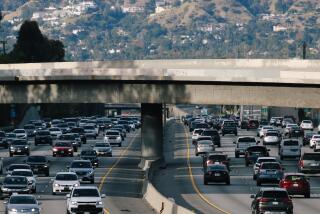Insurers say ride-sharing services should get same coverage as taxis
It was bound to happen.
A dispute among taxicab companies, insurers, regulators and ride-sharing services such as Uber, Lyft and Sidecar has spread to the state Capitol.
At issue is ride-sharing insurance. What kind of policies should these companies and their drivers have? And do they cover damage and injuries to passengers, pedestrians and other vehicles?
Insurers insist that ride-sharing cars, carrying paying customers, should have the same commercial coverage as taxis. That’s the way, they say, to fully protect passengers, who use smartphone applications to snag lifts from private cars. It’s also the recommendation of Insurance Commissioner Dave Jones to the Public Utilities Commission.
Two bills are vying for the attention of the Legislature.
Assemblywoman Susan Bonilla (D-Concord) jumped into the fray. Her bill, AB 2293, backed by insurers, would require that commercial coverage start the moment a driver turns on a fare-finding app and end only when the app is turned off.
“As new ideas are developed and brought into the marketplace, we need to make sure rules are in place to notify and protect those using new services,” she said.
A second bill, AB 2068, by Assemblyman Adrin Nazarian (D-Sherman Oaks), supported by taxicab companies, would mandate that commercial insurance be the primary coverage for ride-sharing cars.
One of the online car booking services, Uber Technologies Inc., based in San Francisco, opposes both bills, saying it already provides “sufficient coverage for every aspect of the trip.” The company, however, said it hopes to reach a compromise that “will provide flexibility for the insurance market to create the right solution for this growing industry.”
Wage theft ads
“Wage theft” is a hot topic this legislative session.
Labor unions have seized on the term as part of a new drive to go after employers, who pay less than minimum wage, withhold overtime pay, keep tips that belong to workers and deny rest breaks.
The unions want lawmakers to give workplace regulators more power to go after law-breaking employers. But they’re up against the powerful California Chamber of Commerce.
Though they regularly clash over union legislation, the two sides have publicly come together to admit that wage theft is a legitimate concern, especially for low-wage workers.
Last week, lobbyists Jennifer Barrera of the chamber and Angie Wei of the California Federation of Labor joined state Labor Commissioner Julie Su to launch a public awareness campaign to educate workers and employers about wage theft.
“It was a unique instance,” Barrera said. “The area of agreement is that wage theft in California hurts both employees and law-abiding employers — who have to compete with those who are not.”
The comments are “a step in the right direction,” said Steve Smith, a labor federation spokesman, and “evidence of a growing acknowledgment that wage theft is a problem in our economy.”
Twitter: @MarcLifsher







